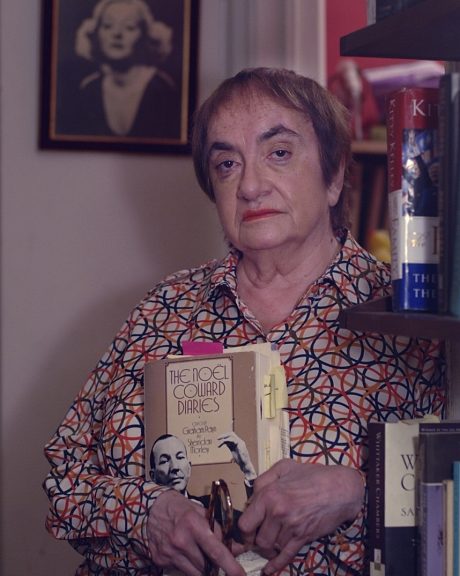LEE ISRAEL (d: 2014) was an American author, known for her involvement in literary forgery. A film adaptation of her 2008 confessional autobiography Can You Ever Forgive Me? was released in 2018. The New York Times called it “pretty damned fabulous.”
She began a career as a freelance writer in the 1960s. The November 1967 edition of Esquire ran her profile of Katharine Hepburn for which Israel had visited California shortly before the death of Spencer Tracy. Israel’s magazine career continued into the 1970s. In the 1970s and 1980s she wrote biographies of actress Tallulah Bankhead, journalist and game show panelist Dorothy Kilgallen and cosmetics tycoon Estee Lauder. The Kilgallen book was well received and appeared on The New York Times Best Sellers List.
In her memoir published decades later, Israel claimed that in 1983 she had received an advance from Macmillen Publishing to begin a project on Lauder, “about whom Macmillan wanted an unauthorized biography — warts and all. I accepted the offer though I didn’t give a shit about her warts.” Israel also claimed that Lauder repeatedly attempted to bribe her into dropping the project. In the book, Israel discredited Lauder’s public statements that she was born into European aristocracy and attended church regularly in Palm Beach, Florida.
When Lauder realized that Macmillan planned to publish Israel’s book, Lauder wrote a memoir that her publisher timed to coincide with it, in fall 1985. Israel’s book was panned by critics and a commercial failure. “I had made a mistake,” said Israel of the episode. “Instead of taking a great deal of money from a woman rich as Oprah, I published a bad, unimportant book, rushed out in months to beat [Lauder’s own memoir] to market.” After this failure, Israel’s career went into decline, compounded by alcoholism and a personality that some found difficult.
Israel is best remembered for her criminal enterprises. By 1992, her career as a writer of books and magazine articles had ended. She had tried and failed to support herself with wage labor. To make money, she began forging a number of letters, estimated to be over 400, by deceased writers and actors. Later, she began stealing actual letters and autographed papers of famous persons from archives and libraries, replacing them with forged copies. She sold both forged and stolen original works.
This continued for over a year before two undercover FBI agents questioned Israel on a Manhattan sidewalk. According to her memoir, in which she cites FBI documents from her case file, the agents left without arresting her or telling her what was going to happen next. She immediately returned to her apartment on Riverside Drive in Manhattan and got rid of all evidence, discarding in public trash cans more than a dozen typewriters she had used to simulate various typefaces. By the time she was served with a federal warrant ordering her to save evidence, it was already gone.
In Israel’s memoir, she also claims she was never arrested or handcuffed, instead receiving summonses for federal court dates. In June 1993, Israel pleaded guilty to conspiracy to transport stolen property, for which she served six months under house arrest and five years of federal probation. Israel later expressed pride in her criminal accomplishments, especially the forgeries.
